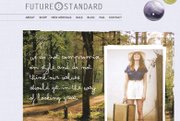Future:Standard's Eye on the Eco Prize
Jessica Althoff is an entrepreneur who hopes her business model won’t last too long. That’s the reason why she called her eco-fashion e-commerce boutique Future:Standard.
“We’re hoping in the future, you don’t have to say ’fair trade’ or ’eco-fashion’ because they have become the standard,” said the recently minted MBA and novice entrepreneur. Eco-fashion was founded on standards such as fair trade, where all clothes will be made by adults who have been paid a fair wage, and by environmentally sustainable manufacturing, which, for example, does not use dyes that contaminate the environment.
Until then, Althoff hopes to spread the word with the Future:Standard e-commerce boutique. She started it in January in San Diego’s Point Loma section. The multi-line e-boutique sells a range of eco-fashion from basics to jeans and handbags from prominent labels such as Alternative Apparel and Pray for Mother Nature by Chip Foster of Chip and Pepper fame. Future:Standard also focuses on emerging brands such as Los Angeles–based Groceries.
Future:Standard is making its debut in a period of recovery after the Great Recession, when a huge swath of the eco-fashion business was devastated. In the couple of years before the recession, there was a lot of excitement about eco-fashion, and many entrepreneurs and labels developed lines of “green” fashion. Independent boutique owners opened eco-fashion shops, said Isaac Nichelson, an eco-fashion and manufacturing consultant. “But it petered out because of survival. The last thing you can think about is costly manufacturing methods during a recession,” said Nichelson, who has consulted with labels such as Volcom and House of Marley. He also is founder and chief executive of eco brand Livity. With the economy recovering, Nichelson has noted a resurgence of interest in environmentally sustainable apparel-manufacturing practices.
The hard times in eco-fashion found their way into Future:Standard’s business plan. “I made a long list of eco-friendly shops,” Althoff said of her research for her company. “But many were out of business when I looked for them.” She noted that the recession’s impact on other shops could prove to be a benefit to hers. Future:Standard faces less competition among eco boutiques and mainstream retail.
Greenopia, an online directory of eco businesses, said there has been no decline in the number of eco-fashion businesses in the past few years, according to Doug Mazeffa, Greenopia’s research director. “This could be because we have seen bigger entities (with multiple locations) entering the space,” he wrote. “They could be offsetting the smaller merchants who may be getting forced out of the marketplace.”
Althoff got into retail when she managed a shoe department at Nordstrom in Santa Clara, Calif., from 2003 to 2005. She earned an MBA degree at the University of San Diego in 2010. During her MBA program, she interned at Pants to Poverty, a London-based fashion label that sells fashion underwear with an eco twist. The underwear is designed in London but made by certified fair-trade farmers and factory co-ops in India. This arrangement helps provide healthcare and reportedly high wages to people in India’s cotton-belt regions of Andhra Pradesh and Maharashtra.
Althoff wrote business proposals for Pants to Poverty while she interned in London. In California, she opened some accounts for the label. Pants to Poverty’s worldwide success convinced her that there could be a market in California, as well. But it will not blossom overnight, she conceded. “We’re growing slowly,” she said.
She forecast that she’ll make $30,000 each month by the end of 2011 and double that monthly amount by 2012. “I’ll get used to running a business lean,” she said. “When it recovers, it will be great for us.”
When consumers visit Future:Standard, they’ll find a retailer that wears its advocacy on its sleeve. On every page of the website, Althoff blogs about what qualities make the label eco-friendly. For the Groceries label, Althoff writes that the line is “committed to chemical-free and renewably sourced textiles.” It also is “constantly integrating new, green practices into their sourcing and manufacturing.”
Althoff practices what she preaches. She delivers merchandise in boxes that have been “pre-loved” (previously used to deliver a package), thereby cutting down on paper waste and demand for new cardboard. She also asked some of her vendors not to send merchandise individually wrapped in plastic. She hopes to cut down on the use of plastics at her business.—Andrew Asch






















